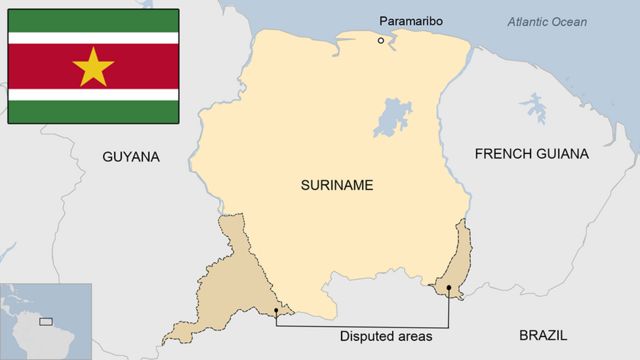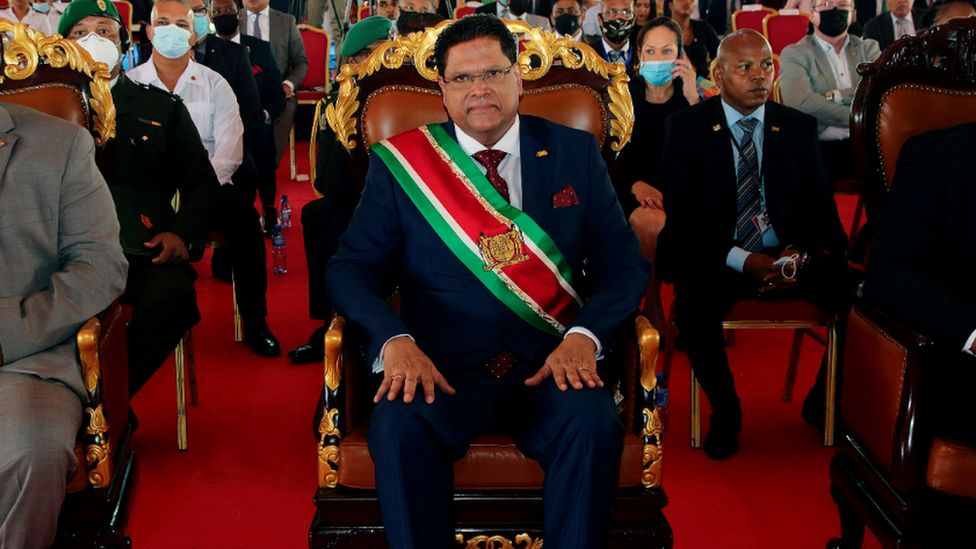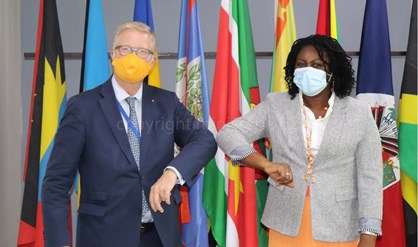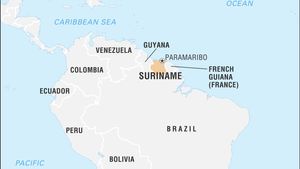So, have you ever wondered about Suriname’s relationship with the European Union? It’s an interesting topic, and today we’re going to dive into the history of this relationship. Trust me, you’re going to learn a lot!
Suriname, a small country located on the northeastern coast of South America, has had a long and complex relationship with the European Union. The ties can be traced back to Suriname’s colonial past, when it was under Dutch rule. As a former Dutch colony, Suriname eventually gained independence in 1975, but its connection to Europe remained strong. In fact, Suriname has maintained close economic and political ties with the European Union for many years.
Over the years, Suriname and the European Union have collaborated on various initiatives and agreements. One of the key aspects of their relationship is development cooperation, with the European Union providing financial support to assist Suriname in its socio-economic development. This assistance has contributed to the country’s infrastructure projects, education and healthcare systems, and environmental conservation efforts. In addition, the European Union has also played a crucial role in promoting good governance and human rights in Suriname.
So, as you can see, Suriname’s relationship with the European Union is a multi-faceted one, encompassing economic, political, and social aspects. If you’re interested in learning more about this fascinating history, keep reading our article for a deeper dive into Suriname’s ties with the European Union.

Colonial Era
Dutch colonization of Suriname
Suriname’s relationship with the European Union (EU) has deep historical roots, starting with the Dutch colonization of the country. In the 17th century, the Dutch established plantations in Suriname, primarily for the cultivation of sugarcane. This period of Dutch rule had a lasting impact on Suriname’s culture, language, and legal system.
Impact of European influence on Suriname
European influence, particularly from the Dutch, significantly shaped Suriname’s development during the colonial era. The Dutch introduced their language, customs, and legal framework to Surinamese society. Plantation agriculture, slavery, and forced labor were prevalent during this time, and the effects of this exploitative system can still be seen in Suriname today.
Independence and Cooperation
Suriname’s independence from the Netherlands
Suriname gained its independence from the Netherlands on November 25, 1975. This marked a significant turning point in Suriname’s history, as the country embarked on a journey of self-determination and international cooperation. However, the newly independent Suriname faced numerous challenges, including political instability and economic dependence on former colonial powers.
Initial engagement with the European Union
Soon after gaining independence, Suriname sought to establish diplomatic relations with the European Union. In 1976, Suriname signed an agreement with the EU, marking the beginning of a cooperative relationship. This agreement laid the foundation for future engagement between Suriname and the EU, focusing on economic cooperation, development assistance, and political dialogue.
Signing of the Lomé Convention
In 1975, Suriname became a signatory to the Lomé Convention, a series of agreements between the European Union and African, Caribbean, and Pacific (ACP) countries. This convention aimed to promote economic and social development in these countries through trade preferences and development assistance. The signing of the Lomé Convention further solidified Suriname’s ties with the EU and opened up opportunities for economic cooperation.

Economic Cooperation
Trade agreements between Suriname and the EU
Trade agreements between Suriname and the European Union have played a crucial role in shaping their economic relationship. The EU has provided market access for Surinamese products, such as fruits, vegetables, and timber, while Suriname has benefited from preferential trade tariffs with EU member states. These trade agreements have helped foster economic growth and diversification in Suriname.
The role of development assistance
Development assistance from the European Union has been instrumental in supporting Suriname’s development goals. The EU has provided financial aid, technical assistance, and capacity-building programs to help strengthen Suriname’s institutions, infrastructure, and social sectors. This assistance has contributed to poverty reduction, improved education, and enhanced healthcare services in Suriname.
Key sectors for economic cooperation
Several sectors have been identified as key areas for economic cooperation between Suriname and the EU. These include agriculture, fisheries, renewable energy, and tourism. The EU has supported Suriname in developing sustainable agricultural practices, promoting responsible fishing, and harnessing renewable energy sources. By collaborating in these sectors, Suriname and the EU aim to achieve economic growth while ensuring environmental sustainability.
Political Relations
Bilateral political dialogues
Suriname and the European Union engage in regular political dialogues to discuss bilateral issues and promote mutual understanding. These dialogues provide opportunities for Surinamese officials and EU representatives to exchange views on various topics, including human rights, democracy, and regional integration. Through these dialogues, Suriname and the EU strengthen their political ties and work towards common goals.
Suriname’s involvement in EU programs
Suriname actively participates in various EU programs and initiatives, which provide funding and technical support for a wide range of activities. These programs cover areas such as education, healthcare, governance, and infrastructure development. Suriname’s involvement in EU programs helps to address challenges and promote sustainable development in the country.
Collaboration on regional and global issues
Suriname and the European Union also collaborate on regional and global issues of mutual concern. They work together to address climate change, promote biodiversity conservation, and tackle transnational threats, such as organized crime and illegal trafficking. By joining forces, Suriname and the EU can have a greater impact on these complex challenges.

The Cotonou Agreement
Negotiations and signing of the Cotonou Agreement
The Cotonou Agreement, signed in 2000, replaced the Lomé Convention and established a new framework for cooperation between the EU and ACP countries, including Suriname. The agreement focuses on poverty eradication, sustainable development, and integration of ACP countries into the global economy. Suriname actively participated in the negotiations and signed the Cotonou Agreement, reaffirming its commitment to the EU-ACP partnership.
EU’s support for Suriname’s development goals
The Cotonou Agreement has provided a platform for the European Union to support Suriname’s development goals. Through financial assistance, technical cooperation, and policy dialogue, the EU helps Suriname implement programs and projects that contribute to poverty reduction, good governance, and social progress. This support is essential in helping Suriname overcome its development challenges and achieve sustainable and inclusive growth.
Cooperation within the framework of the agreement
Within the framework of the Cotonou Agreement, Suriname and the EU collaborate on various initiatives. These include programs in economic development, education and training, healthcare, and environmental protection. The agreement also promotes the respect for human rights, the rule of law, and democratic principles. Cooperation within the Cotonou Agreement strengthens Suriname’s relationship with the EU and enhances its prospects for socio-economic development.
EU Funding and Projects
European Development Fund and financial assistance
The European Development Fund (EDF) is a key source of financial assistance for Suriname. The EDF provides grants and loans to support Suriname’s development projects in sectors such as agriculture, infrastructure, education, and healthcare. This funding has been crucial in promoting sustainable growth and improving the standard of living for Surinamese citizens.
Implementation of EU-funded projects in Suriname
Various EU-funded projects have been implemented in Suriname, contributing to the country’s socio-economic development. These projects focus on areas such as rural development, private sector development, environmental conservation, and capacity building. By working together, Suriname and the EU can maximize the impact of these projects and ensure their successful implementation.
Benefits and challenges of accessing EU funds
Accessing EU funds provides numerous benefits for Suriname, including financial support, technical expertise, and access to larger markets. EU-funded projects also help create employment opportunities and promote entrepreneurship in Suriname. However, accessing these funds can be challenging due to the complex application processes, eligibility criteria, and reporting requirements. Suriname continues to work towards improving its capacity to effectively utilize EU funds.

Trade and Investment
EU as a major trading partner for Suriname
The European Union is one of Suriname’s major trading partners. Suriname exports a wide range of products to the EU, such as timber, fruits, vegetables, and minerals. In return, Suriname imports machinery, equipment, and manufactured goods from EU member states. The EU’s market provides valuable opportunities for Suriname’s exporters and contributes to the country’s economic growth.
Investment opportunities and foreign direct investment
Suriname offers attractive investment opportunities for European companies, particularly in sectors such as mining, renewable energy, and tourism. Foreign direct investment from the EU has the potential to create jobs, transfer technology, and stimulate economic development in Suriname. The government of Suriname has implemented investment-friendly policies and established special economic zones to encourage greater foreign investment.
Market access and trade facilitation
The European Union has been actively working to improve market access and trade facilitation for Suriname. Through preferential trade agreements, reduced tariffs, and simplified customs procedures, the EU aims to enhance trade between Suriname and EU member states. These measures contribute to the expansion of Surinamese exports and promote economic integration between the two regions.
Environmental Cooperation
EU support for environmental protection in Suriname
The European Union has been a strong supporter of environmental protection efforts in Suriname. Through funding, technical assistance, and knowledge sharing, the EU helps Suriname address environmental challenges such as deforestation, biodiversity loss, and climate change. The EU’s support contributes to the preservation of Suriname’s rich natural heritage and the sustainable management of its resources.
Collaboration on sustainable development
Suriname and the EU collaborate on promoting sustainable development practices. This includes initiatives to promote renewable energy, responsible natural resource management, and sustainable agriculture. By working together, Suriname and the EU aim to achieve economic development while minimizing the negative environmental impacts.
Addressing climate change and biodiversity concerns
Climate change and biodiversity loss are pressing global issues, and Suriname and the EU recognize the need for joint action. They cooperate on initiatives to reduce greenhouse gas emissions, protect vulnerable ecosystems, and promote nature conservation. By addressing these concerns together, Suriname and the EU contribute to global efforts to mitigate climate change and preserve biodiversity.

Migration and Mobility
Mobility partnerships and visa facilitation
Suriname and the European Union have established mobility partnerships to facilitate legal migration and promote people-to-people exchanges. These partnerships aim to streamline visa processes, promote cultural understanding, and foster cooperation in areas such as education and research. They provide opportunities for Surinamese citizens to study, work, and travel in the EU, while also facilitating EU citizens’ visits to Suriname.
Managing Surinamese diaspora in EU countries
Suriname’s diaspora in EU countries plays a significant role in the country’s development. Many Surinamese living abroad send remittances and invest in Suriname, contributing to the country’s economy. Suriname and the EU collaborate on initiatives to support Surinamese diaspora communities, promote their integration in host countries, and strengthen their ties with Suriname.
Cooperation on addressing migration challenges
Migration challenges, including irregular migration and human trafficking, require collaborative efforts between Suriname and the EU. They cooperate on initiatives to enhance border security, combat human trafficking, and provide assistance to vulnerable migrants. By working together, Suriname and the EU aim to ensure safe, orderly, and regular migration and protect the rights of migrants.
Human Rights and Rule of Law
EU’s engagement in promoting human rights
The European Union is committed to promoting human rights and the rule of law around the world, including in Suriname. The EU provides support for initiatives that strengthen democratic institutions, protect civil liberties, and promote social inclusion. This engagement helps Suriname strengthen its human rights framework and ensures the protection of the rights of all Surinamese citizens.
Support for justice and security sector reforms
The EU supports Suriname in implementing reforms in the justice and security sectors. This assistance aims to enhance the efficiency and effectiveness of the legal system, improve access to justice, and strengthen law enforcement capabilities. By working together, Suriname and the EU contribute to the establishment of a fair and transparent justice system and ensure the safety and security of Surinamese citizens.
Cooperation on combating organized crime
Transnational organized crime poses significant threats to Suriname’s security and stability. Suriname and the European Union collaborate on initiatives to combat organized crime, drug trafficking, and money laundering. This cooperation includes intelligence sharing, capacity building, and support for law enforcement agencies. By joining forces, Suriname and the EU can better address these complex challenges.
Challenges and Disputes
Disputes over trade and agricultural policies
As with any relationship, Suriname’s relationship with the European Union has faced its fair share of challenges and disputes. Disagreements over trade policies, including tariffs and subsidies, have occasionally strained the relationship. Agricultural policies have also been a contentious issue, particularly in relation to Suriname’s efforts to protect its domestic agriculture sector.
Environmental concerns and deforestation
Environmental concerns, including deforestation, have been a source of tension in Suriname’s relationship with the European Union. The EU has raised concerns about the unsustainable logging practices in Suriname and the impact on the country’s forests and biodiversity. Suriname, on the other hand, has emphasized the need for sustainable development and the responsible use of natural resources.
Issues related to governance and corruption
Governance issues, including corruption and accountability, have posed challenges to Suriname’s relationship with the European Union. The EU has stressed the importance of good governance, transparency, and the fight against corruption in its cooperation with Suriname. Addressing these issues remains essential for building trust and ensuring the effective use of development assistance.
Future Prospects and Partnership
Enhancing Suriname’s integration with the EU
Suriname and the European Union are committed to deepening their partnership and enhancing Suriname’s integration into the EU and the global economy. Both parties recognize the importance of fostering economic growth, promoting sustainable development, and addressing shared challenges. By working together, Suriname and the EU can unlock new opportunities and achieve their common goals.
Potential areas of further cooperation
There are numerous potential areas for further cooperation between Suriname and the European Union. These include enhancing trade relations, expanding investment opportunities, strengthening infrastructure, promoting research and innovation, and deepening cultural and educational exchanges. By exploring these areas, Suriname and the EU can deepen their partnership and achieve mutual benefits.
Strengthening the partnership for mutual benefits
Suriname’s relationship with the European Union is a dynamic partnership that continues to evolve. Both parties are committed to further strengthen their ties for the benefit of Surinamese citizens and EU member states. By fostering dialogue, cooperation, and mutual understanding, Suriname and the EU can build a prosperous and sustainable future together.
Conclusion
Suriname’s relationship with the European Union has evolved over the years, from its colonial era to its independence and subsequent cooperation. The EU has been a significant partner in supporting Suriname’s development goals, promoting sustainable growth, and addressing common challenges. Suriname values its partnership with the EU and recognizes the significance of cooperation in achieving its socio-economic aspirations. As Suriname continues on its path of development, the relationship with the European Union will remain crucial for its success.